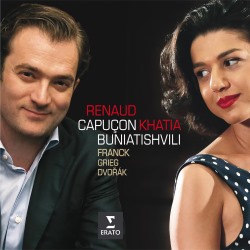
|
César FRANCK (1822-1890)
Violin Sonata in A major (1886) [28.16]
Edvard GRIEG (1843-1907)
Violin Sonata No. 3 in C minor, Op. 45 (1886/87) [23.03]
Antonín DVOŘÁK (1841-1904
Four Romantic Pieces, Op. 75, B. 150 (1887) [14.53]
Renaud Capuçon (violin), Khatia Buniatishvili (piano)
rec. 28-30 April 2014, Auditorium Campra, Conservatoire Darius Milhaud, Aix-en-Provence, France
ERATO 2564 625018 [66.20]
On this Erato release Renaud Capuçon and Khatia Buniatishvili have recorded a mouth-watering programme of late-Romantic works all written within a year of each other in 1886/87.
It was Martha Argerich who brought together Frenchman Capuçon and Buniatishvili a Georgian in collaboration. Their success at the Lugano festival in 2012 has ensured that the partnership has continued. Capuçon relates “Khatia and I met over Franck’s sonata. This is the sonata that sealed our musical partnership, the sheer joy of playing together.” I have seen both performers in concert/recital on several occasions and it is clear that they are artists of high accomplishment and lofty integrity.
A warhorse of the chamber music repertoire Franck’s Sonata, composed in 1886 remains a challenging proposition. Composed as a wedding present for his friend and fellow-countryman the violin virtuoso Eugene Ysaÿe this four movement piece is an epic work regarded by many as the finest violin sonata in all French music. It has worthy claims to be one of the finest Violin Sonatas ever written. We hear gloriously warm playing of the opening Allegretto ben moderato. I was impressed by the way this duo create an intense yearning quality with an undertow of heartbreaking passion. This is incisive playing - just listen to the second movement Allegro; all spring-like freshness and vibrancy. Perceptively interpreted the Recitative-Fantasia reveals a heavy world-weariness but I love the way the tension is splendidly tightened and eased. Serious and determined in mood the final Allegretto poco mosso suggests an undercurrent of sadness and regret — almost despair.
Franck’s Violin Sonata is frequently recorded and the catalogues offer a number of excellent versions. Standing out like a beacon is the evergreen 1977 Kingsway Hall, London performance from Kyung-Wha Chung and Radu Lupu. This remains a confident recommendation on Decca.
Grieg’s Violin Sonata No. 3 in C minor, Op. 45 written in 1886/87 follows the second Violin Sonata in G major by twenty years. It seems that Grieg was inspired to write the work by a visit by the young Italian violist Teresina Tua to Grieg’s home near Bergen. The first performance was in Leipzig given by the Russian violinist Adolf Brodsky in 1887. Opening with the squally Allegro molto ed appassionato Capuçon and Buniatishvili serve up heady passion, energy and excitement. Inherently affectionate and undemanding, the Allegretto espressivo alla Romanza with its songful, dance-like central section is played with a fluent, lightness of touch. Marked Allegro animato the enjoyable Finale is spontaneously high-spirited with a vigorous close. Capuçon and Buniatishvili’s playing can stand confidently alongside the spirited account from Augustin Dumay and Maria João Pires who recorded all three Grieg violin sonatas at the Studio Lankwitz, Berlin in 1993 on Deutsche Grammophon.
The set of Four Romantic Pieces was composed by Dvořák in 1887. These are works of toothsome lyricism yet designed to be within the scope of amateur players. They are charming arrangements of the Miniatures - trio for two violins and viola (1887). They are entitled: Cavatina, Capriccio, Romance and Elegy (Ballad). Later that year the Romantic Pieces were introduced at a recital at the Umělecká Beseda, Prague with violist Karel Ondříček and the composer at the piano.
Capuçon and Buniatishvili afford real sensitivity to the unalloyed tenderness of the Cavatina while their playing of the lively Capriccio has a distinct gypsy feel. The Romance is played with insatiable tenderness followed by the Elegy (Ballad): a lovely piece with a reflective disposition. Although I only rarely come across the Four Romantic Pieces in recital there are a surprising high number of fine recordings. Of real merit are the recordings from violinist Gil Shaham and pianist Orli Shaham on Deutsche Grammophon, Gidon Kremer and Oleg Maisenberg on the same label and from Josef Suk and Josef Hála on Supraphon. Also worthy of attention are the accounts from Itzhak Perlman/Samuel Sanders on EMI and James Ehnes/Eduard Laurel on Analekta.
Recorded in 2014, the sound feels natural being clear and admirably balanced. I found the booklet notes concise but reasonably informative. The two musicians are in total sympathy with the music with playing that communicates their sense of sheer enjoyment.
Michael Cookson
 |
 |
|














